Thanks to the likes of Sir Jackie Stewart and Professor Sid Watkins, safety in Formula 1 has improved to the point where death is extremely rare. Only 1 driver has passed away during a Grand Prix weekend since the tragic 1994 San Marino Grand Prix. Ayrton Senna was the last to die in Formula 1 for twenty years, but the Brazilian is not on this list. There will be a lot of drivers that aren't included in this list, as a total of 32 have passed during championship Grands Prix, and even more have died in other racing series and non-championship events.
Unlike some lists, this one isn't ranked, as it seems unfair to compare drivers who never got a chance to fully live up to their potential. They all have one thing in common, though -- they were supreme talents who had much more to give before their time on earth was untimely cut short.
#1 - Gilles Villeneuve (1950-82)
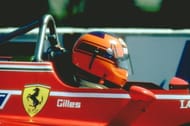
It may seem odd that a driver with just six wins from over sixty F1 starts is considered one of its greatest ever talents, but there's many credible reasons to consider Gilles Villeneuve a legend of Formula 1.
The French-Canadian raced once for McLaren in 1977, before becoming a full-time driver for Ferrari the following year. At Ferrari, Villeneuve would become an icon of motorsport, thanks to his incredible pace and unwavering determination. Gilles acted as an excellent backup to Jody Scheckter during the South African's championship-winning campaign in 1979, winning 3 races on the way to second place in that year's driver's championship. 1980 was one of the Scuderia's worst years ever, but improvements were made for 1981, with Villeneuve winning a further two Grands Prix, including Monaco.
Villeneuve is often cited as one of the best drivers to have never won the world championship - alongside Sir Stirling Moss - and 1982, in my opinion, is when he would've broken his duck. After a pair of retirements and a disqualification, Villeneuve was pointless going into the fourth round of the season at Imola.
After a controversial and intense race-long battle with teammate Didier Pironi, Gilles had scored his thirteenth and final podium place with second position. A heated argument ensued and the pair never spoke to each other again. The next race at Zolder would prove to be his last, as on a qualifying run for the Belgian GP, he crashed his Ferrari, flew out of the cockpit, and sustained fatal injuries. He was only a 32-year-old then and had many seasons left in him.
Had he lived, Villeneuve would've won the driver's championship in 1982, before a rumoured move to McLaren in 1983. Pironi suffered career-ending injuries at the German GP later that season, and still managed to finish second in the driver's championship, despite not competing in the final five rounds. That's partly why I believe Villeneuve would've won that year's title had he lived. If that happened, he probably would've won more championships, as McLaren drivers won titles in all but one year in the next eight seasons.
Enzo Ferrari famously didn't care much for his drivers, even the ones which won his team championships, but Villeneuve was the exception to the rule, with Il Commendatore often referring to Gilles as one of his sons. That was far from the end of the Villeneuve name's influence in F1, though, as Gilles' son Jacques competed in Formula 1 between 1996 and 2006, winning the world championship in '97.
If you want to learn more about Villeneuve Senior, check out our Top 5 Canadian F1 Drivers of All Time.
#2 - Stefan Bellof (1957-85)
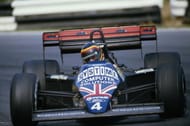
A glance at Stefan Bellof's official Formula 1 record won't reveal anything too spectacular. After all, the German never had a podium finish, but that's far from the whole story. Bellof made his F1 debut in 1984 for Tyrrell, the team that was once an impressive force in the days of Sir Jackie Stewart, but was then mid-table mediocrity.
Ayrton Senna stole the headlines after the Monaco GP in '84, but Bellof was arguably even more impressive, finishing third on the road. He started that race in 20th place and was the fastest man on the track by the time the red flags were brought out in soaking conditions. Tyrrell's results were later wiped during that season, so that's why the record books don't state that Bellof stood on the podium.
1985 wasn't as good of a season as the previous one on the road for Tyrrell, but Bellof still managed to pull off points finishes, most notably a fourth place in Detroit. Bellof also shone outside of Formula 1, winning the World Sportscar Championship in 1984 but this series would be the scene of his death in 1985. During the 1000km of Spa-Francorchamps, the 27-year-old clashed with Jacky Ickx at Eau Rouge, an impact so heavy that it cost him his life. Had Bellof lived, Michael Schumacher may not have become the first German world champion, as Stefan could well have achieved that before his compatriot.
#3 - Jim Clark (1936-68)
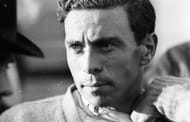
Jim Clark is, without a doubt, one of the best drivers to have ever sat in an F1 car, still holding some major F1 records over 50 years after his death. Indeed, Ayrton Senna -- who some say is the best ever -- believed that Clark was the best of all time, and he's hardly alone in thinking that.
Clark drove exclusively for the Lotus team and was instrumental in bringing success to Colin Chapman's team. Clark's speed over 1 lap was incredible, taking pole position in almost half the Grands Prix he competed in. The percentages and stats speak for themselves. He won a third of every race he competed in, setting fastest lap in a similar percentage of GPs and the Brit still holds the record for the most "Grand Slams" (win, pole, fastest lap and led every lap) in F1 history.
His 25th and final F1 victory came in his final race, breaking the record for wins that was held by the great Juan Manuel Fangio. Clark would die during a Formula 2 race at the Hockenheimring in 1968, being a 2-time champion by the age of 32. Graham Hill (Clark's teammate) won the driver's championship in '68, so the Scot would've had a shot at the title that year had he lived.
I'd have honestly backed Clark to come out on top there and with Lotus winning driver's titles in 1970 and '72, Clark could well have matched Fangio's tally of five driver's titles. Like Ferrari when Villeneuve passed away, Clark's death hit Colin Chapman hard, with close friends of the design engineer saying that he was never the same after.
Want to learn more about Clark? Check out our Top 5 British F1 drivers of all time!
#4 - Jochen Rindt (1942-70)
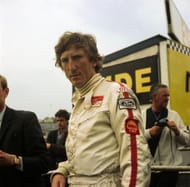
The man who replaced the late Clark at Lotus met a similarly tragic fate just two years into the job. After a single appearance for Rob Walker's racing team in 1964, Cooper hired Jochen Rindt full-time for 1965. The Cooper wasn't the best car during his time there, but he did finish third overall in the driver's championship in 1966, just behind John Surtees in the same machinery.
1969 was his building year, in which he claimed his first win in the sport at Watkins Glen. 1970 was one of the most dominant displays by a driver ever, where Rindt won five of the first eight rounds and all but guaranteed the driver's world championship by the time he arrived at Monza. Tragedy would strike in qualifying, however, as Rindt flew off the track and into the barriers, ending his life. He was only 28 years old, and he became the first and hopefully only ever F1 posthumous world champion. Had he lived, he would've won more championships if he stayed at Lotus. There's little doubt about that for the same reasons I discussed about Clark.
If you want to learn more about Rindt, check out our Top 5 Austrian Drivers of all-time!
#5 - Jules Bianchi (1989 - 2014)
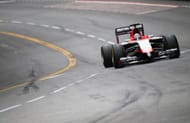
When Sebastian Vettel won the 2015 Hungarian Grand Prix, he famously stated that Jules Bianchi would've been in the Ferrari "sooner or later", and it's hard to disagree with the German. Bianchi only competed in two F1 seasons, but like Bellof, he left a lasting impression on everybody.
The Frenchman drove for Marussia during his whole career, but had come through the Ferrari driver academy, being the first driver to be signed onto the programme. The Marussia wasn't a competitive car, in fact, it was probably the slowest on the grid during 2013 and '14. However, that didn't stop Jules from finishing in the top ten, crossing the line eighth at the Monaco Grand Prix. A penalty demoted him to ninth, but this was the team's only ever points haul.
A tragic crash at that year's Japanese GP curtailed what was promising to be a superb career, as Bianchi became Formula 1's first fatality for over 20 years. Had Bianchi lived past his 25 years, it would've been fascinating to see how he'd stack up against Vettel and perhaps Charles Leclerc too. We've been robbed of that scenario, but we should be thankful that we got to witness an immense talent competing.
Jules Bianchi remains Formula 1's most recent, and hopefully last, fatality during a Grand Prix.
Would you like to read some more bios of F1's greatest lost talents? Let us know in the comments below!
Complete list of F1 Driver Deaths
